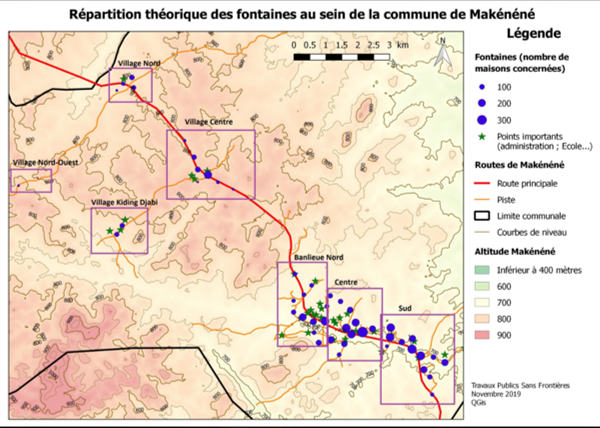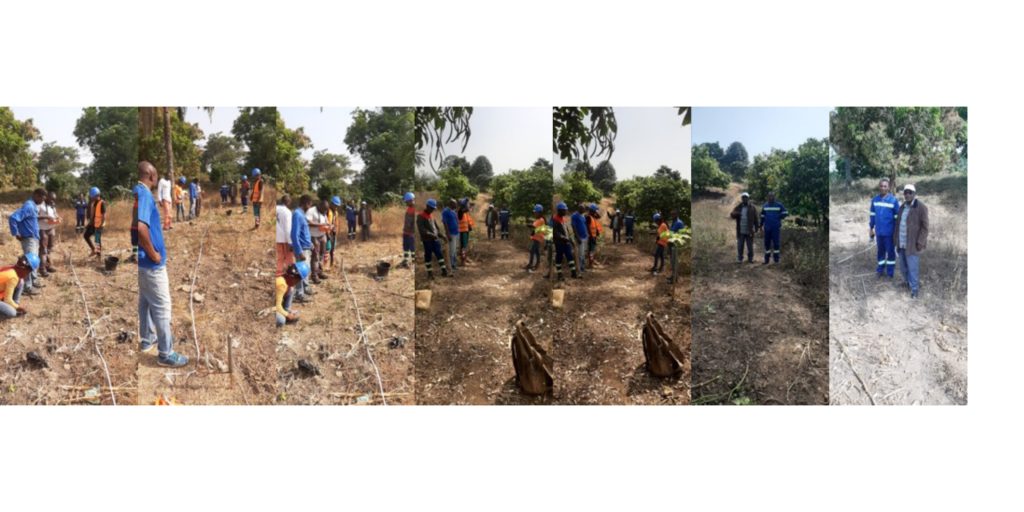Makénéné
Summary
The city of Makénéné suffers from a lack of access to drinking water and sanitation.
Currently, the water consumed by the inhabitants is drawn from shallow wells that cannot guarantee the quality of the water. Water pollution leads to various waterborne diseases, which prompted the local health centres to approach us to develop a project. TPSF and its partners, notably the local NGO Dypamak, has determined to establish a water supply system by drilling boreholes and installing a reservoir and standpipes.
On the spot, we also noticed a lack of sanitation infrastructure. We then decided to initiate the installation of sanitation facilities. After consultation with our local partner, it seemed appropriate to focus this part of the project on the installation of latrine cubicles, an essential facility especially in school institutions.
Context
Access to drinking water and sanitation is a daily struggle for the 20 000 inhabitants of the rural commune of Makénéné. As an agricultural and commercial city located in the département of MBAM and INOUBOU (central region of Cameroon), most households in this commune rely on traditional methods for their water supply and autonomous sanitation, and for excreta disposal. Despite the fact that the right to water has been internationally recognized as a human right (UN 2010), the vast majority of the population still lacks access to safe drinking water and adequate sanitation, which has posed significant threats to their lives and health.
In 2019, the Cameroun decentralized the management of water and sanitation management to the communes. It is in partnership with the Makénéné municipality that we have been able to set up this project in order to ensure a sustainable production and distribution of drinking water for all the inhabitants of the city in a hygienic and safe environment.
In 2021, the agglomeration of Vichy Community joined us in the form of decentralized cooperation with the city of Makénéné.
To know more about the city of MAKENENE: https://cartecommunale.cm/web/arrondissement/63/siteWeb
Objectives of the project and the expected results
The overall objective of this project is to ensure sustainable access to drinking water in an effort to improve the well-being, health, and economic and social development of the people of Makénéné.
Specifically and not exhaustively, the project aims to:
- Construct the water distribution network to supply water to 20,000 inhabitants of the city
- Establish water and sanitation management structures that are citizen-based and participatory, with equal representation
- Train a maintenance and repair team for the infrastructures built
- Raise the population’s awareness of the risks and dangers of water-borne diseases, of key hygiene practices, and of the importance of integrating women into society, particularly in local management bodies
- Accompany the transfer of water and sanitation competences to the municipality through a provisional organization of services in accordance with the local context

The first phase is a reduction of the project to two regions, with the same water and sanitation components. Therefore, it will allow us to have hindsights on the local conditions and the potential difficulties. In the first phase, we chose to rely on the existing facilities. We have put an old well in operation and will rehabilitate a reservoir that has fallen into disuse.
Their emplacement will allow to supply two public standpipes localisées in the city center near various institutions (medical centers, school, city hall, police, gendarmerie, sub-prefecture). 2000 direct beneficiaries will have a first safe access to drinking water.
At the same time, we will set up an awareness campaign on the dangers of drinking undrinkable water.
Phase two will expand the existing work with a second reservoir, an expanded distribution network and the installation of 14 additional standpipes. In addition, we will install 126 latrine cubicles in 12 schools and in the central market square.
At the same time, governance bodies (Water Users’ Associations at the local level and the Central Management Committee at the communal level) will gradually be set up.
Then, in subsequent phases of the project, we will complete the distribution system with a third reservoir and 16 more standpipes. This will bring the number of standpipes to 32.
In parallel, we will train 4 people to maintain and service the infrastructure. At the same time, we plan to carry out additional studies on hygiene and sanitation and on the environmental impact in order to guarantee the health of the population concerned as well as to protect the environment of this territory. This could be the object of a sanitation project complementary to the drinking water supply project if necessary and if financially feasible. The creation of new fountains will be done during these phases to complete the water distribution network.
Principal partners
The Dypamak association, with a humanitarian and social nature, is a professional partner specialized in water, with experts such as Mr. Albert Bias, a polytechnic engineer specialized in water issues.
For vocational training at the local level, the Institut Universitaire de la Côte Douala (IUC) and the Lycée professionnel de Makénéné (construction site-school) have joined us for this project. In France, the Centre d’Etudes et de Recherches du Développement International de Clermont-Ferrand (CERDI) and the CFC Egletons decided to take part in this adventure.
Aquassistance has decided to join us through an agreement to provide its expertise in ex-ante study.
In March 2021, the Vichy agglomeration signed a decentralized cooperation agreement with the city of Makénéné to carry out the first phase of the project. The two agglomerations will work hand in hand on the first phase of this project: the rehabilitation of an existing well, the rehabilitation of a reservoir and the installation of a distribution network and standpipes in the center of Makénéné.
In January 2022, hydrogeological studies were started to identify the location and depth of the water table.

